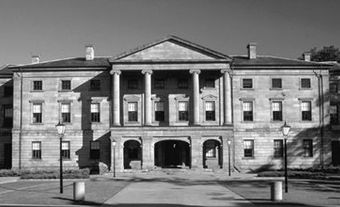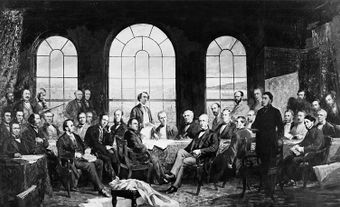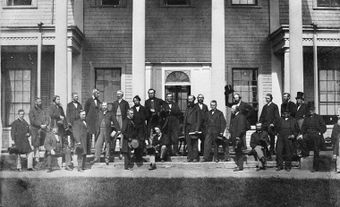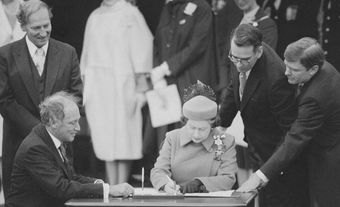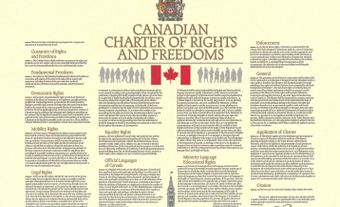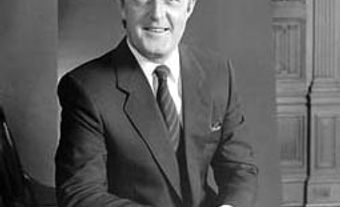The Meech Lake Accord was a failed attempt to add Quebec’s consent to the Constitution. It would have made provincial powers stronger. It also would have declared Quebec a “distinct society.” Support for the Accord fell apart in 1990. Many Québécois saw this as a rejection of Quebec. Support for separatism soared there. It eventually led to the 1995 Quebec Referendum.
(This article is a plain-language summary of the Meech Lake Accord. If you are interested in reading about this topic in more depth, please see our full-length entry, Meech Lake Accord.)
Background: Quebec and the Constitution
In 1981, Quebec premier René Lévesque refused to sign the Constitution Act, 1982. He felt he had been betrayed by the other premiers when they patriated the Constitution (took control of it from Britain). Quebec was still legally bound by the Act. But the absence of Quebec’s signature left it estranged from Canada’s “constitutional family.”
In the mid-1980s, Prime Minister Brian Mulroney hoped to end the impasse. He opened talks with all the provinces. Quebec premier Robert Bourassa made a series of proposals. If accepted, Quebec would sign the Constitution.
What the Accord Said
There were two parts of the Quebec proposal. The first recognized Quebec as a “distinct society” within Canada.
The second sought to enhance the powers of the provinces. Under the Accord, a province could opt out of a federal program. It could do this if it started a similar program of its own. The Accord also gave the provinces a role in selecting people for the Senate and the Supreme Court. It required at least one first ministers conference each year. And it required that the issues of Senate reform and the fisheries be discussed at those meetings.
All the premiers agreed to the package. It was known as the Meech Lake Constitutional Accord of 1987.
Amending Formula
An amending formula (a method for making changes) had been added to the Constitution Act, 1982. Most changes required the consent of the Senate, the House of Commons and two-thirds (seven) of the provinces. Those provinces must make up 50 per cent of the population of Canada. (This is called the 7/50 rule.) Some other matters required the consent of Parliament and all the provinces.
Under the Accord, all changes would require the unanimous consent of Parliament and the provinces.
Public Reaction
In 1987, the Accord was popular. Many hoped it might help to soften separatism in Quebec.
But over the next three years, critics emerged. Pierre Trudeau came out of retirement to oppose the Accord. He felt it would weaken federal power. He said Mulroney “sold out” to the provinces. Many in English Canada also grew to dislike the distinct society clause. They feared it would give Quebec special status.
The Accord began to lose favour with the public. But it was still popular in Quebec. Fears arose that the Accord’s failure could create a backlash there.
Ratification Process
Quebec’s National Assembly approved the Accord on 23 June 1987. To become law, it had to be ratified within three years. This required consent from Parliament and all 10 provinces. The deadline was 23 June 1990.
In early June 1990, all premiers agreed to ratify the Accord. But support unravelled on 23 June.
In Manitoba, all parties had agreed to endorse the Accord. But it still required public hearings. The legislature could dispense with these; it just needed the consent of all members. But one member, Elijah Harper, did not consent. As a result, the Accord did not come to a vote in that province. (See Editorial: The Death of the Meech Lake Accord.)
Legacy
The failure of the Meech Lake Accord led Lucien Bouchard to leave the Progressive Conservative caucus and create the Bloc Québécois. He had been Mulroney’s environment minister and Quebec lieutenant. He was joined by PC and Liberal backbenchers.
Canadians had grown weary of constitutional wrangling. Mulroney’s popularity was plummeting. Despite this, he pushed ahead. He began a new round of talks. The result was the Charlottetown Accord of 1992. It was defeated in a national referendum. Mulroney resigned soon after.
See also Constitution of Canada (Plain-Language Summary); Constitution Act, 1867 (Plain-Language Summary); Constitution Act, 1982 (Plain-Language Summary); Canadian Charter of Rights and Freedoms (Plain-Language Summary); Patriation of the Constitution (Plain-Language Summary); Charlottetown Accord (Plain-Language Summary).

 Share on Facebook
Share on Facebook Share on X
Share on X Share by Email
Share by Email Share on Google Classroom
Share on Google Classroom
